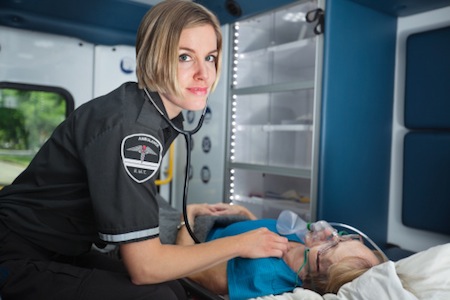Todd: So Meg, you are talking about being in the military, and you said you were a medic. Can you explain what that is?
托德:梅格,你说过你当过兵,你曾是医护兵。你能解释一下吗?
Meg: Yeah. So a medic, which now I believe is called health care specialist, is – I always say it's kind of similar to being like a paramedic where it's not a full nurse job. I think nurses have more training like in civilian side nurses, but similar to paramedic where you have certain, like, minor procedures that you're trained to do and high-level things than just an EMT like doing IVs and giving shots and stitches and things like that. And you're trained – because it's the military, you're especially trained for emergency situations, and how to treat someone who has maybe some serious life-threatening wounds. So that's a medic.
梅格:好。我想现在医护兵被称为医疗保健专员,我一直说医护兵和急救人员差不多,并不完全是护理工作。我认为护士,普通的护士要接受更多培训,而急救人员在经过培训后要能做小手术还有一些高级别的护理,而不仅仅是像紧急医疗技术员那样,进行静脉注射,拍片子或缝针等。要接受训练,因为这是在军队,你要接受培训以应对紧急情况,治疗那些可能受了严重的伤有生命危险的人。这就是医护兵。
Todd: Wow. That sounds like a really difficult job. I mean, it's not your typical, just soldier job. You must have had a lot of schooling and education.
托德:哇哦。那听起来是个非常难的工作。你并不仅仅是服兵役。你一定接受过很多培训和教育。
Meg: I had – well, everyone goes through the initial, about two and a half months like basic training. And that's more kind of basic combat skills and physical training that kind of thing. And then I had four months past that to train to be a medic. So we went through like emergency medical technician course just like civilian side. I got certified with that. And then we had additional training for the military skills like IVs and emergency procedures, that kind of thing.
梅格:没错,最开始,所有人都要完成两个半月的基础训练。就是基本的战斗技能和体能训练。然后我进行了四个月的医护兵培训。我们要学习紧急医疗技术员课程,就像一般的急救人员一样。培训结束后我获得了证书。然后我们还要接受额外的军事技能培训,比如静脉注射和一些急救程序。
Todd: Right. Can you explain what IV is?
托德:好。你能解释一下静脉注射吗?
Meg: IV is an intravenous – like getting fluids into your body. So if you've been injured and you've lost a lot of blood or maybe you're dehydrated and you need some fluid in your body quickly, then we stick a needle into your vein and then the fluids go in. And the needle comes back out but a little tube stays in. And then you can get fluids quickly that way.
梅格:静脉注射,就是将液体输入你的身体。如果你受伤了,失血过多,那你就会出现脱水,这时就需要将一些液体快速地注入你的体内,我们将注射针插入你的静脉,然后将液体注入。将针取出,但是留下导管。这样液体就可以快速流动了。
Todd: So anybody that's been to the doctor knows that's always kind of the anxious moment when the nurse or the person who's going to stick the needle in. Were you good at doing that?
托德:看过医生的人都知道,护士打针的时候是最紧张的时刻。你擅长打针吗?
Meg: So once I learned how to do it, I think I was pretty good. And I actually enjoyed doing it, not in a creepy way but, you know, it was – I guess, because I was decent at it that it was a part of my job that I enjoyed. But for myself, before we went through that training, I actually became dehydrated and needed to get an IV myself. And I was terrified because I really hadn't had that before in my life. And so, the nurse was going to come, you know, put the needle in my arm and I was like, "No, isn't there another? I'll just drink a lot of water." And she was saying, "Aren't you going to be a medic." And I was like, "Oh, I haven't trained yet. Don't do it." So yeah.
梅格:我学会以后,做得非常好。我其实很喜欢这个工作,那并不可怕,我做得很好,而且那是我工作的一部分,所以我很喜欢。其实,我在接受培训以前,曾出现过脱水的情况,需要接受静脉注射。当时我非常害怕,因为我之前从未经历过。护士过来以后,打算将针头插入我的胳膊,我问她:“有没有其他方法?我多喝水可以吧。”她说:“你不是要当医护兵吗?”我回答说:“哦,我还没接受培训呢。不要给我注射。”就是这样。
Todd: Oh, that's cool. Yeah. I was recently in the hospital and they had me strapped up for both blood and for the water, the intravenous drip. And it's annoying because you can't really move, like if you want to get up and walk anywhere, you're strapped with all these tubes. And it's not very convenient.
托德:哦,那太酷了。我不久之前去医院了,他们给我止血包扎,还给我打点滴。那让我觉得很烦,因为不能动,如果要起来走动,要一直带着那些导管。非常不方便。
Meg: Yeah, yeah. Or at least you have to careful. When I was getting the IV, I didn't know that the needle doesn't stay in your arm. Now, for some things, it does. For blood, maybe it's different, I'm not sure. But yeah, so I was trying to be so careful too but you still want it to go well so you don't want to move very much.
梅格:对,没错。至少你要小心一些。我接受静脉注射的时候,我不知道针不留在胳膊上。有些情况针是不取出的。不过治疗出血,可能会有不同,我也不清楚。我尽量小心行动,我希望静脉注射的效果能很好,所以我不会动太多。
Todd: Right. So what percentage of people would you say freak out when they get the needle?
托德:对。你认为有多少人在打针的时候会害怕?
Meg: Probably 90% or 95%.
梅格:大概90%或95%。
Todd: Oh really?
托德:真的吗?
Meg: Yeah. Even, you know, tough Army guys would come in and be – and they'd be like, "Oh, I'm fine. I'm fine in a bit." "Well, we need to give you an IV." And they'd be like, "Oh..."
梅格:对,甚至军人在接受治疗时,一开始会说:“哦,我还好,我没什么事。”当我们说“你要进行静脉注射”时,他们的反应是“哦……”
Todd: Right. Yeah. Nobody likes that.
托德:对,没有人喜欢打针。
Meg: No.
梅格:没错。
Todd: So you transitioned. You were in the medical profession and then you moved to education. Why did you leave the medical profession for education?
托德:你转行了。你之前从事医疗工作,然后你转向了教育业。你为什么离开医疗行业,进入教育界?
Meg: Yeah. That's interesting because I became a medic in the military because I thought after I – when I could continue college that I would be a nurse or a doctor. But my time serving as a medic helped me learn that that was not what I wanted to do for my career after all. So I definitely am glad that I had those skills and the things that I learned and was able to experience. But I had – English had kind of been on the back burner. And so then I said, "Okay, let me revisit this," and it led to English education.
梅格:对。这其实很有意思,因为我在军队是医护兵,我当时以为我继续大学学业以后会成为护士或医生。可是,我在当医护兵的时候,我意识到那并不是我想从事的行业。对于我掌握了这些技能、习得了一些经验,我感到非常高兴。那时我暂时搁置了英语教学,后来我想“我要重新开始英语教学”,所以我进入了教育界。
Todd: Wow. Have you ever thought about being like an English specialist for people in the medical fields like teaching doctors and nurses?
托德:哇哦。你有没有想过成为医学领域的英语专家,可以教医生和护士?
Meg: I guess I haven't thought about that specifically. Sometimes I thought about going back to military. They do have something like English schools in the military. And so, I guess that would be related. Also it could be – yeah, so that would be interesting. Something to think about.
梅格:我想我并没有想过那么具体的设想。有时我想回到军队中去。军队里也有英语学校。那是相关的。这可能也会很有意思。这可以考虑一下。
Todd: All right. Great. Thanks, Meg.
托德:好。太好了。谢谢你,梅格。

译文属可可原创,仅供学习交流使用,未经许可请勿转载



